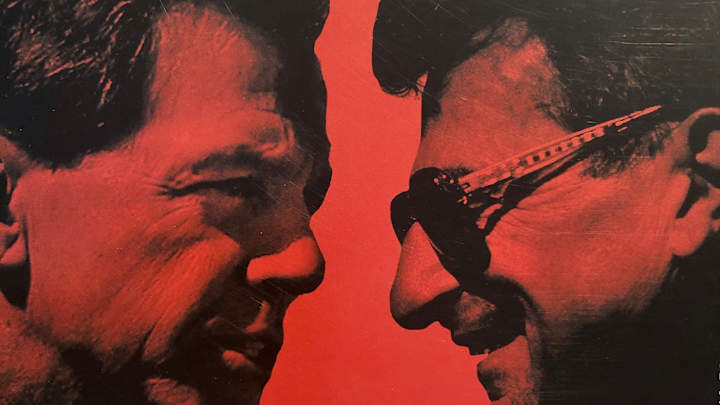Tale of the Coaching Tape: Nick Saban vs. Joe Paterno

It was a moment in which everyone knew that they were witnessing history, but no one would completely appreciate until much later.
Prior to kickoff at Bryant-Denny Stadium on September 11, 2010, Nick Saban stood at midfield with not only opposing coach Joe Paterno, but special guest Bobby Bowden. The three laughed and smiled, enjoying the once-in-a-lifetime occasion, with the one fresh off a national championship graciously hosting the two winningest coaches in major college football history.
It certainly wasn’t lost on Saban, although even he didn’t realize that the photo op was really a sort of passing of the torch.
"I think the thing you take from guys like Bobby Bowden and Joe Paterno is that they are good and have been good for a long time," Saban said that week. "They have also been great ambassadors for the game, and they have done what they do in a classy way. They don't talk about other people. They don't run other programs down. They just do it in a first-class way.
“I think that is probably the biggest thing that I have tried to emulate Joe Paterno, Bobby Bowden and those types of guys, is because of how they've done what they do, the kind of people that they are and the kind of character they have. I think that is important for college football. I think that is an important part of the integrity of the game."
A lot changed during the years to follow, including the Penn State child sex-abuse scandal involving an assistant coach and subsequent toppling of an icon. Saban went from telling Crimson Tide fans before the previously mentioned game that he would take it as a personal insult if anyone booed when the Nittany Lions took the field, to handing Paterno his final loss a year later.
At the time there were few, if any, coaches that Saban respected more.
“Coach Paterno is probably one of the greatest coaches of all time in college football, not in terms of how many games he's won, but how he's contributed to the game in so many positive ways,” Saban said. “To give you an example, he was part of an academic committee. When I was at Michigan State, we had a player who sort of tried to get a waiver for a sixth year because he broke his leg twice. But he really couldn't get into graduate school, he had to get into a continuing-ed program. At that time, you had to get into graduate school to be able to do that. Joe was the head of that committee, and he actually got it passed through and all that for us at Michigan State.
“What was amazing was, we were playing at Penn State. I forget the exact score of the game, but this guy that he got eligible ran for a touchdown with about a minute to go in the game that put us ahead. They went down and kicked a field goal and won the game. He did things for players and made decisions based on what was right, not what was politically correct for him or his school or anything else. I have a tremendous amount of respect for that because he's done it a hundred times for lots of players and lots of people involved in college football.”
Paterno, an English major from Brown University who initially said that he never wanted to coach football, was hired as an assistant and subsequently named Penn State’s head coach in 1966. Over 46 years he won 409 games (111 were erased by an NCAA decision, only to be reinstated) and won two national championships, 1982 and 1986.
Under his direction, the school’s string of consecutive non-losing seasons wasn’t snapped until 1988 at 49. He notched wins at the Orange, Cotton, Fiesta, Liberty, Sugar, Aloha, Holiday, Citrus, Rose, Hall of Fame, Outback, Capital One, and Alamo bowls, and over the years Beaver Stadium’s capacity went from 46,284 to 107,282.
He had a Heisman winner with running back John Cappelletti in 1973 (1,522 rushing yards and 17 touchdowns), an amazing collection of linebackers ranging from LaVar Arrington to Jack Ham, and had some epic matchups against Alabama along the way. Among them was the Sugar Bowl to decide the 1978 national championship, which was highlighted by a goal-line stand, and the 1981 game to set up Paul W. “Bear” Bryant’s record-setting 315 win the following week at Auburn.
Paterno and his wife Sue donated more than $4 million to Penn State for building projects and to endow faculty positions and scholarships, and began a campaign to raise millions for the construction of a new library that bears his name. Yet despite all that, time will still be the deciding factor when it comes to his legacy.
“Joe Paterno is one of the greatest lessons in life, of I don’t care how good things are going you have to watch out,” Bowden said. “You know, here’s a guy for sixty years nobody did it better. I had to write an article about him fifteen years ago for a magazine and I said when Joe retires he’ll go out as the greatest coach ever. To go sixty years at one school, stay out of trouble and graduate his players, then all of a sudden this thing came up and didn’t have anything to do with it. He didn’t (react) like they thought he should, but it just ruined him. I just can’t believe that now he’s not here any more, because I’ve known him and we were very close for years. Again, it’s a great lesson for all of us, you had better watch your life, it can be taken away from you just like that.”
Nick Saban vs. Joe Paterno
(Statistics through 2018 season)
Category Saban; Paterno
Seasons 23; 46
Consensus national titles 6; 2
Top five finishes 9; 13
Top 25 finishes 16; 32
Overall record 232-62-1; 409-136-3
Percentage 78.5; 74.9
Losing seasons 0; 4
Bowl record/CFP record 14-10; 24-12-1
Percentage 58.3; 66.2
Conference titles 9; 1-b
Conference record 138-42-1; 31-54-b
Consensus All-Americans 41; 33
First-round draft picks 34; 33
Record against ranked teams 82-40; 86-85-1
Percentage 67.20; 50.29
Record against top 10 teams 42-21; 35-47
Percentage 66.67; 42.7
Ratios/percentages
National title seasons One every 3.8 seasons; 23
Consensus All-Americans 1.78 every season; .72
First-round draft picks 1.48 every season; .72
Average wins vs. ranked teams 3.57 each season; 1.87
Wins over top-10 teams per year 1.82 every season; .76
*All wins from 1998 through 2011 were vacated from his career 409-136-3 record, but reinstated in 2015.
b- Penn State was independent until it joined the Big Ten in 1993. Before vacated wins his league record was 95-54.
Some of the information in this report was also used in the book "Nick Saban vs. College Football."
